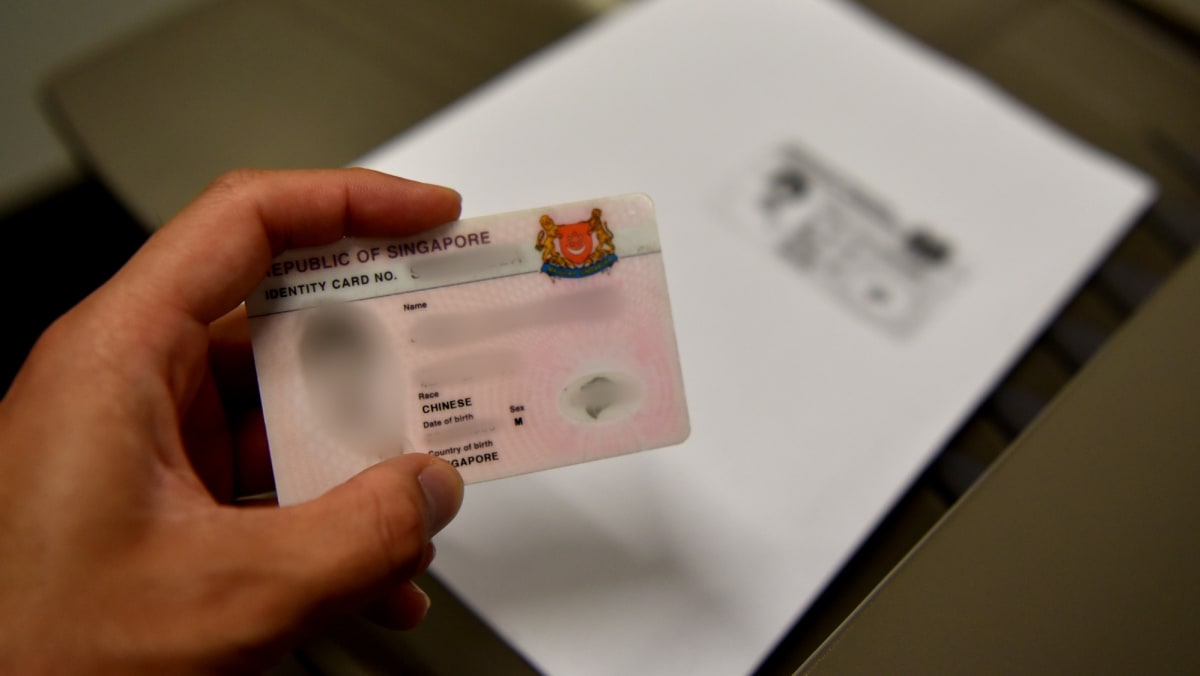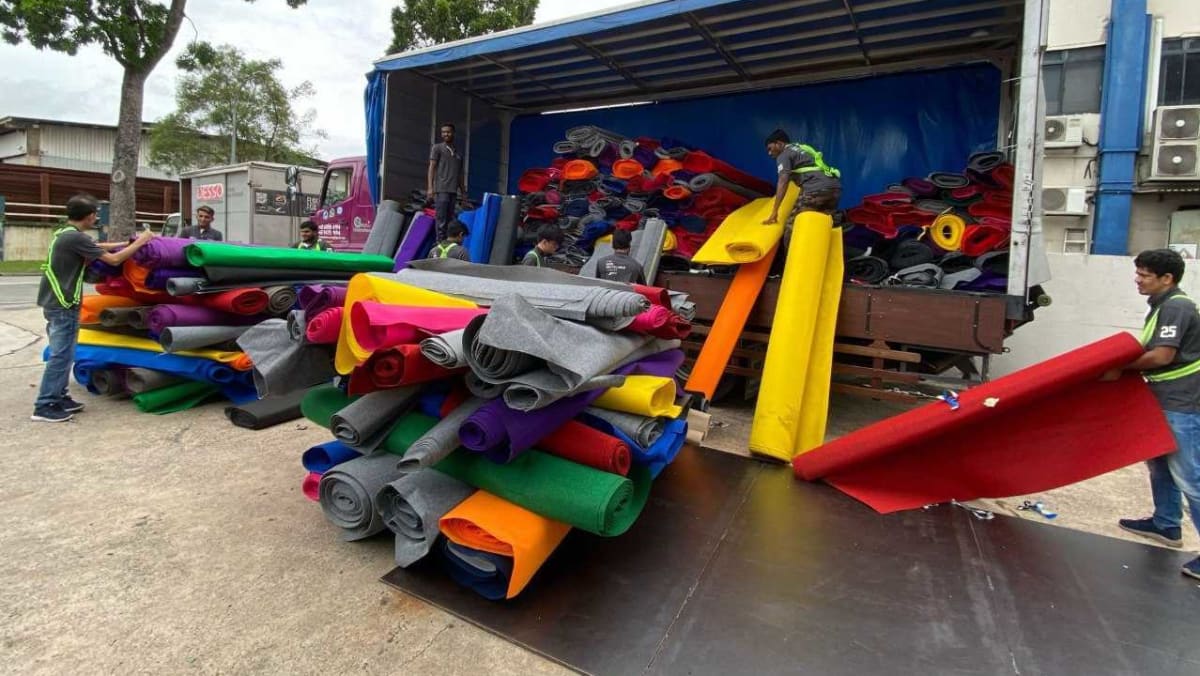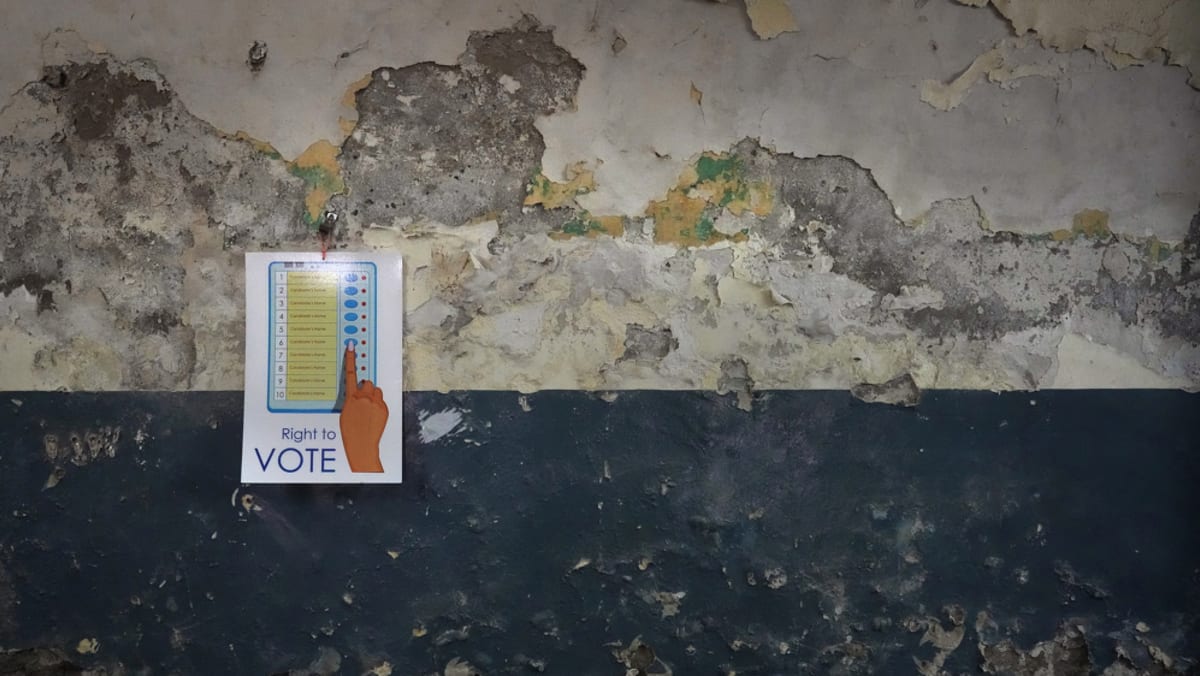In a little over a year, The Mill International has recycled around 65,400 sq m of carpets - and it's just getting started.
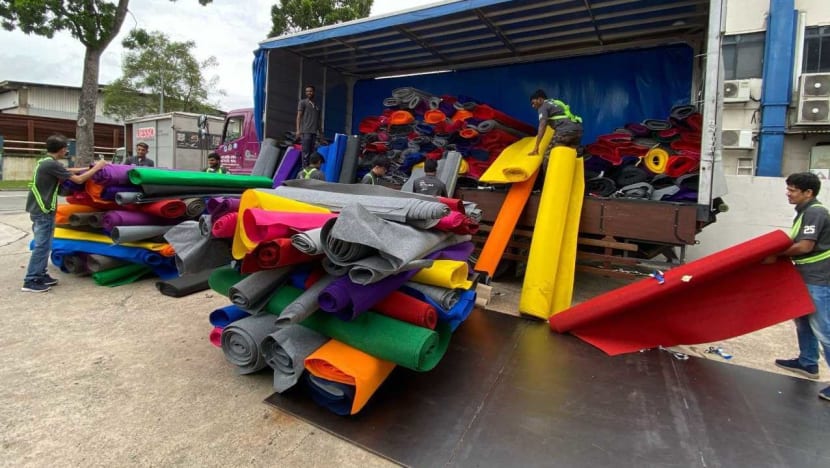
A lorry carrying up to 7 tonnes of The Mill International's carpets on its first ever recycling run on Jan 17, 2024. (Photo: The Mill International)
New: You can now listen to articles.

This audio is generated by an AI tool.
SINGAPORE: What would a carpet and a chair have in common?
As unlikely as it seems, a local company has successfully created one from the other.
By recycling event floor covering into resin pellets that are then moulded into seating options, carpet supplier The Mill International has added a layer of sustainability to the meetings, incentives, conventions and exhibitions (MICE) industry.
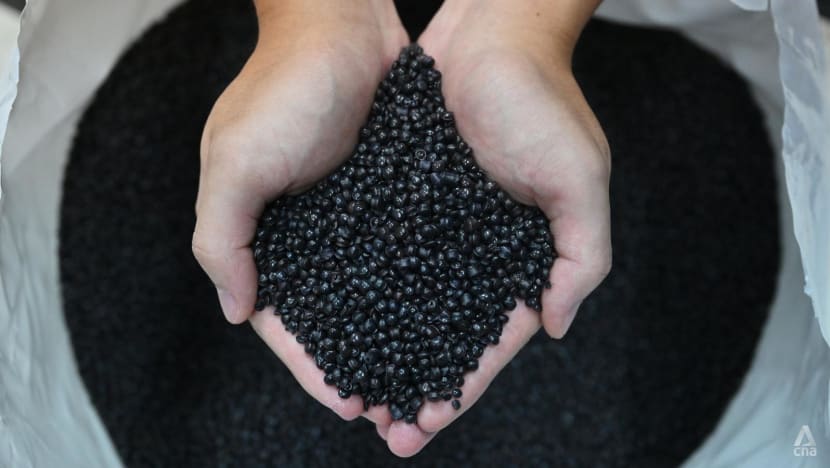 These are resin pellets produced from recycled carpets, which can then be made into luggage tags and even chairs under The Mill International's efforts to make the major events sector more sustainable. (Photo: CNA/Jeremy Long)
These are resin pellets produced from recycled carpets, which can then be made into luggage tags and even chairs under The Mill International's efforts to make the major events sector more sustainable. (Photo: CNA/Jeremy Long)
The company is riding a push to make Singapore the world's top destination for such events.
In 2024 alone, it tapped on a wave of prominent gatherings such as the Coldplay concert and Singapore Airshow, to roll out its sustainable carpets.
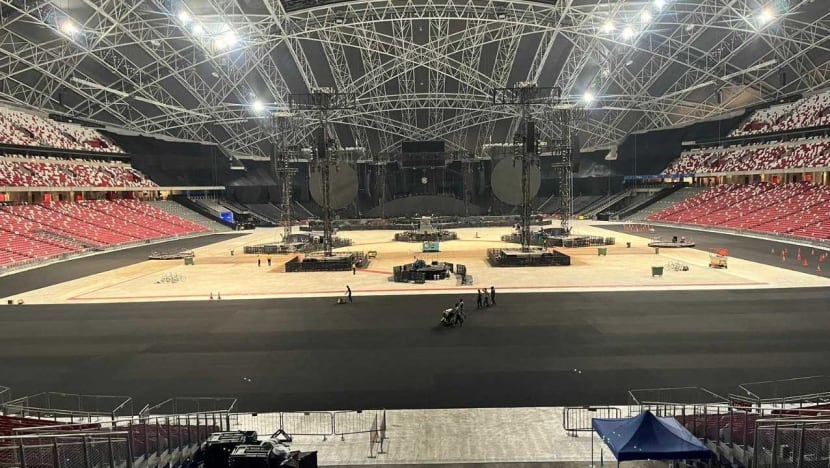 The Mill International laid down a total of 6,000 sq m of recyclable black carpet for the Coldplay concert at the National Indoor Stadium earlier in 2024. (Photo: The Mill International)
The Mill International laid down a total of 6,000 sq m of recyclable black carpet for the Coldplay concert at the National Indoor Stadium earlier in 2024. (Photo: The Mill International)
Since July 2023, The Mill International has recycled around 65,400 sq m - or more than 16 tonnes - of carpets.
To put things into perspective, this amount could easily cover the area of about 480 five-room Housing Board flats.
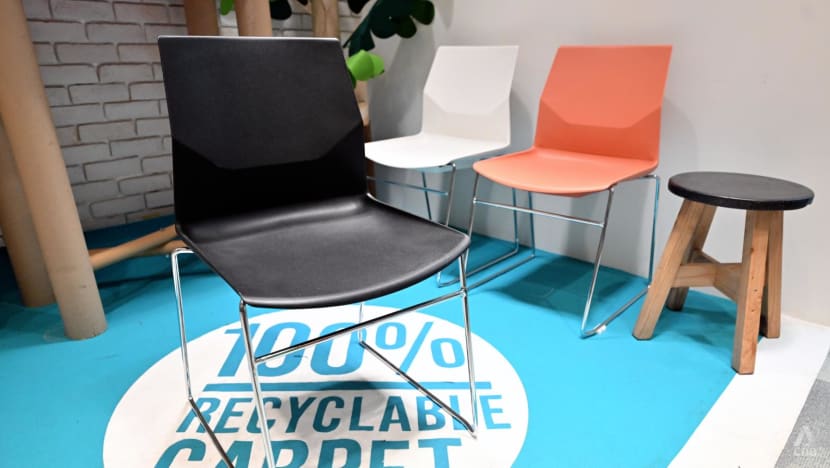 A black plastic chair made from recycled carpets, on display at the office of The Mill International at Tannery Road on Nov 29, 2024. The company is expecting to produce 300 of such chairs in the first quarter of 2025. (Photo: CNA/Jeremy Long)
A black plastic chair made from recycled carpets, on display at the office of The Mill International at Tannery Road on Nov 29, 2024. The company is expecting to produce 300 of such chairs in the first quarter of 2025. (Photo: CNA/Jeremy Long)
The company started out by partnering local recyclers such as Plastify and Semula-Asia to try and convert carpets into smaller products.
They came up with luggage tags, carabiners and gardening pots.
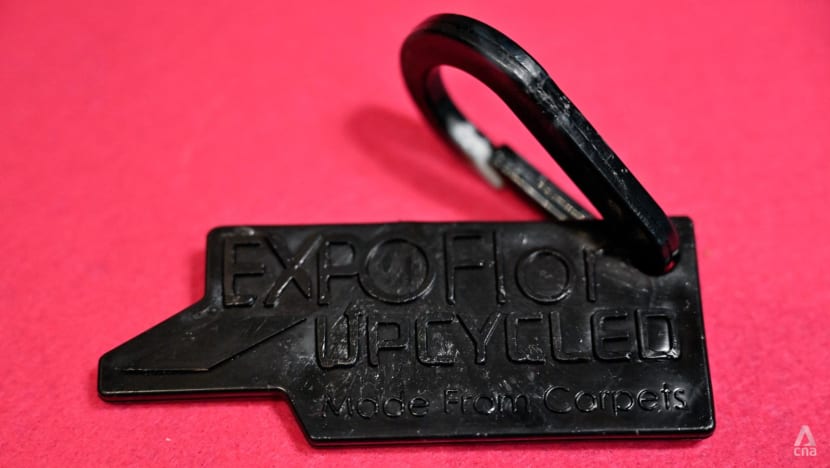 A plastic luggage tag made from recycled carpets. (Photo: CNA/Jeremy Long)
A plastic luggage tag made from recycled carpets. (Photo: CNA/Jeremy Long)
But The Mill International wanted to scale up its efforts and after some process of trial and error, discovered a viable end product in chairs that could in turn be used again in the events space.
"The moment you don't use sustainable carpets, there's only one destination ... which is Pulau Semakau," The Mill International's sustainability manager Adriel Cheung told CNA.
"You can reuse it as much as you want, but ultimately, when it gets frayed, then you have to throw it into the landfill."
Their sustainable carpets are sourced from Belgium and made from 100 per cent polypropylene, a fully recyclable plastic.
Most event carpets typically contain latex, which makes it challenging to recycle, Mr Cheung added.
The Mill International hopes to shift to a fully sustainable stock of carpets by 2030.
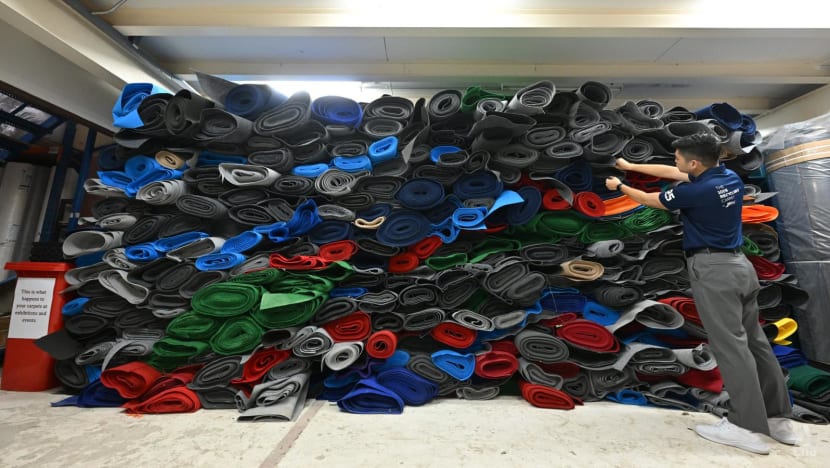 Piles of used carpets that are ready to be recycled, stacked up in The Mill International's warehouse. (Photo: CNA/Jeremy Long)
Piles of used carpets that are ready to be recycled, stacked up in The Mill International's warehouse. (Photo: CNA/Jeremy Long)
EARLY HURDLES
The Mill International's director Matthew Fong was interested in sustainable carpets as early as 2019.
To learn more about what he was dealing with, he attended conferences in Europe to speak to experts, and considered procuring a carpet recycling machine.
Then came 2020 and the COVID-19 pandemic.
Tourism and large events - The Mill International's entire business - were immediately hit. With no source of income, and having to maintain his workers, "it was pretty brutal", said Mr Fong, whose sustainability endeavours had to be put on hold.
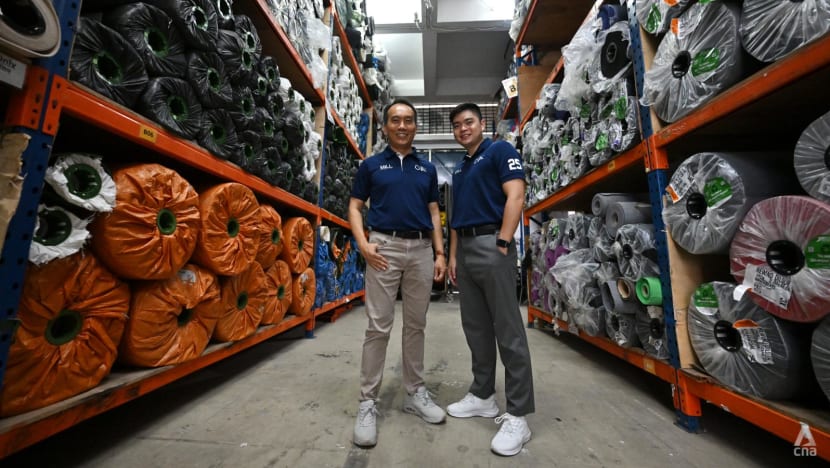 The Mill International's director Matthew Fong (left) and sustainability manager Adriel Cheung at the company's warehouse on Nov 29, 2024. (Photo: CNA/Jeremy Long)
The Mill International's director Matthew Fong (left) and sustainability manager Adriel Cheung at the company's warehouse on Nov 29, 2024. (Photo: CNA/Jeremy Long)
With the MICE industry stuttering back to life over the next few years, Mr Fong took the time - 11 months, to be exact - to search for a firm with the capability to recycle event carpets.
"We approached many recycling manufacturers, but none of them were interested in recycling carpets, mainly because ... (it) has never been done before (and) our tonnage is not interesting to them," said Mr Cheung.
They settled on Ravago, a Belgian firm with a facility in Tuas. Even then, it needed a minimum of 10 tonnes of carpet to make it worth the cost of operating its recycling machine.
For reference, The Mill International laid 7,400sq m of carpet for a football World Cup qualifying match between China and Singapore at the Indoor Stadium in March. This amounted to less than one-fifth of the tonnage required by Ravago.
Though The Mill International was eventually able to amass 10 tonnes of carpet to be recycled - into resin beads - the next step was to find another company with the suitable expertise to handle the upcycling.
The search took nearly as long - and took them outside of Singapore, where space and cost factors mean that factories here are less likely to have the equipment for injection moulding. That's a manufacturing process where material is injected into a mould to form the desired furniture.
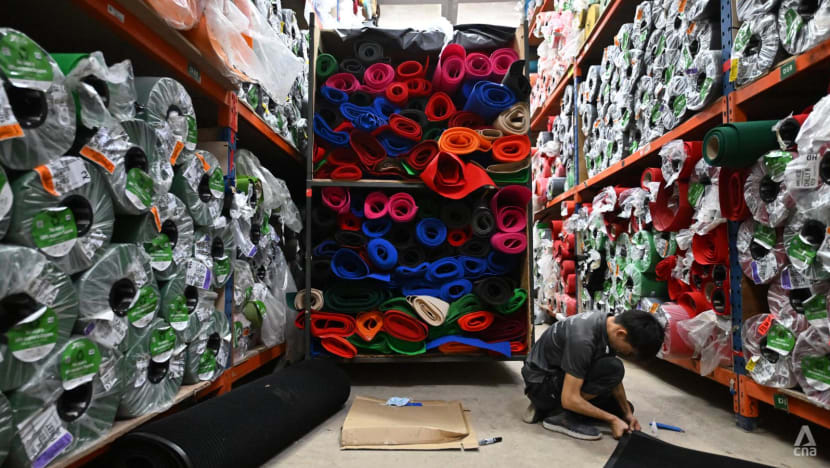 A tonne of carpets at The Mill International's warehouse along Tannery Road on Nov 29, 2024. Ten of these are required to hit the minimum order for recycling at the company's partner Ravago. (Photo: CNA/Jeremy Long)
A tonne of carpets at The Mill International's warehouse along Tannery Road on Nov 29, 2024. Ten of these are required to hit the minimum order for recycling at the company's partner Ravago. (Photo: CNA/Jeremy Long)
Some factories The Mill International approached were also daunted by the uncertainty of dealing with recycled polypropylene, which could stick to and damage machines if not handled properly.
One factory's attempt to produce a chair out of the resin failed, with a prototype that was too wobbly.
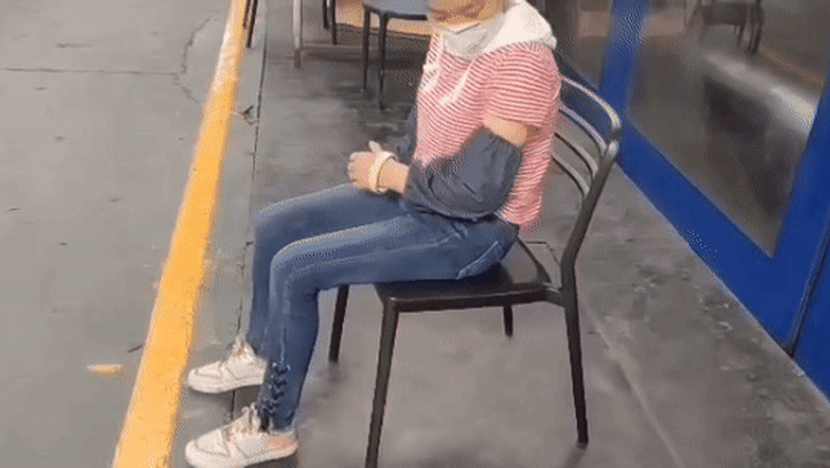 The Mill International's first chair prototype, made entirely out of resin recycled from used carpets, was a rickety flop. (Gif: The Mill International)
The Mill International's first chair prototype, made entirely out of resin recycled from used carpets, was a rickety flop. (Gif: The Mill International)
The Mill International finally found a factory in China that could produce a sturdy chair.
It currently pairs an upcycled seat with legs made out of steel, though the company is considering using other material in the future.
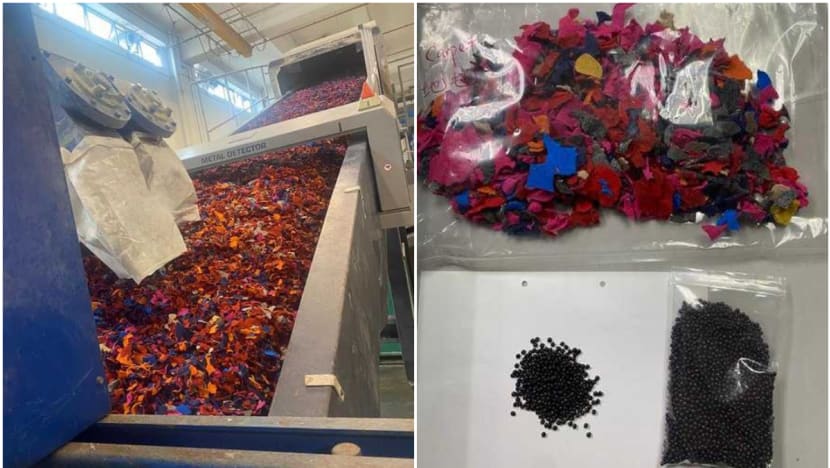 Used polypropylene carpets are shredded at Ravago's factory in Tuas before they are processed into hardened resin beads. (Photos: Ravago)
Used polypropylene carpets are shredded at Ravago's factory in Tuas before they are processed into hardened resin beads. (Photos: Ravago)
HOW CARPETS BECOME CHAIRS
The Mill International's carpets can be used three to four times depending on their thickness, before becoming threadbare and sent for recycling thereafter.
Workers first have to clear debris off the carpets and remove any metal attached to them.
Portions that are contaminated with food stains or water are disposed on site. Washing is not an option as the carpets are prone to mould and bacteria.
Those deemed suitable for recycling are then stored at The Mill International's warehouse until it accumulates a sufficient quantity to send to Ravago.
There, carpets are fed into a shredder and processed into resin pellets.
These are sent on to the partner factory in China, which uses injection moulding to produce chairs en masse.
The Mill International hopes to receive its first batch of 300 recycled polypropylene chairs - made from an estimated 6 tonnes of resin pellets - by the first quarter of next year.
Each chair costs about US$35 to make, including shipping.
The plan is to include chair rental with The Mill's usual offering of carpets for events.
But they are open to selling and according to Mr Cheung, some event organisers have already expressed interest in replacing their current inventory with The Mill's carpet-origin chairs.
"There's a huge buzz about making (event) booths from sustainable material ... But flooring is something that we don't see being a priority yet, which is honestly to us quite astounding, because flooring is something that aesthetically immediately elevates your event," said Mr Cheung.
"A common way to solve carpets being unsustainable is that you don't use carpets at all, and that's what we realised there's a trend now," he added.
"But we are hoping more people know about this carpet recycling initiative, and that actually the carpets you use aren't just simply going to be thrown away."


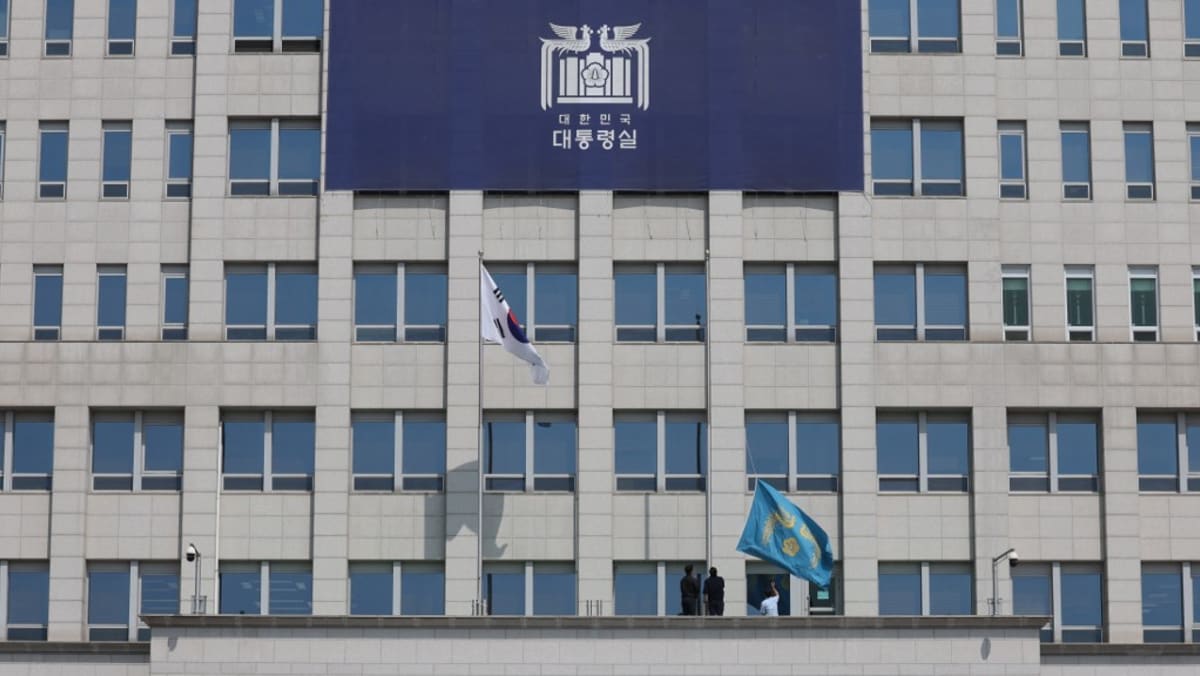
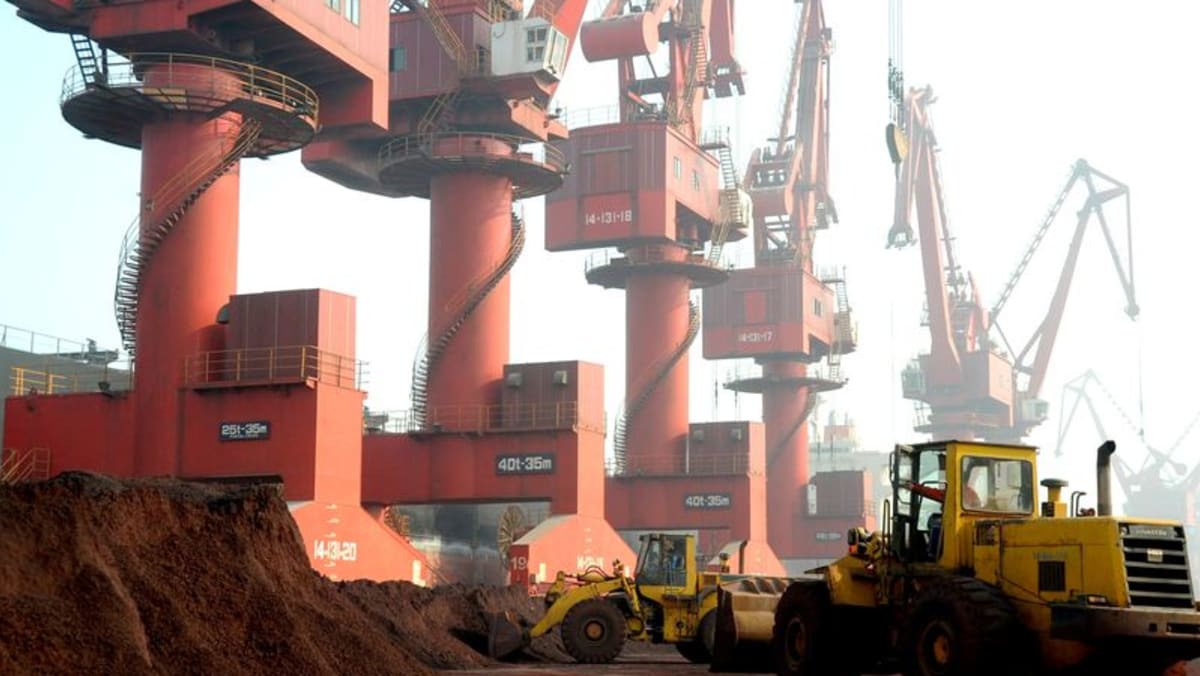

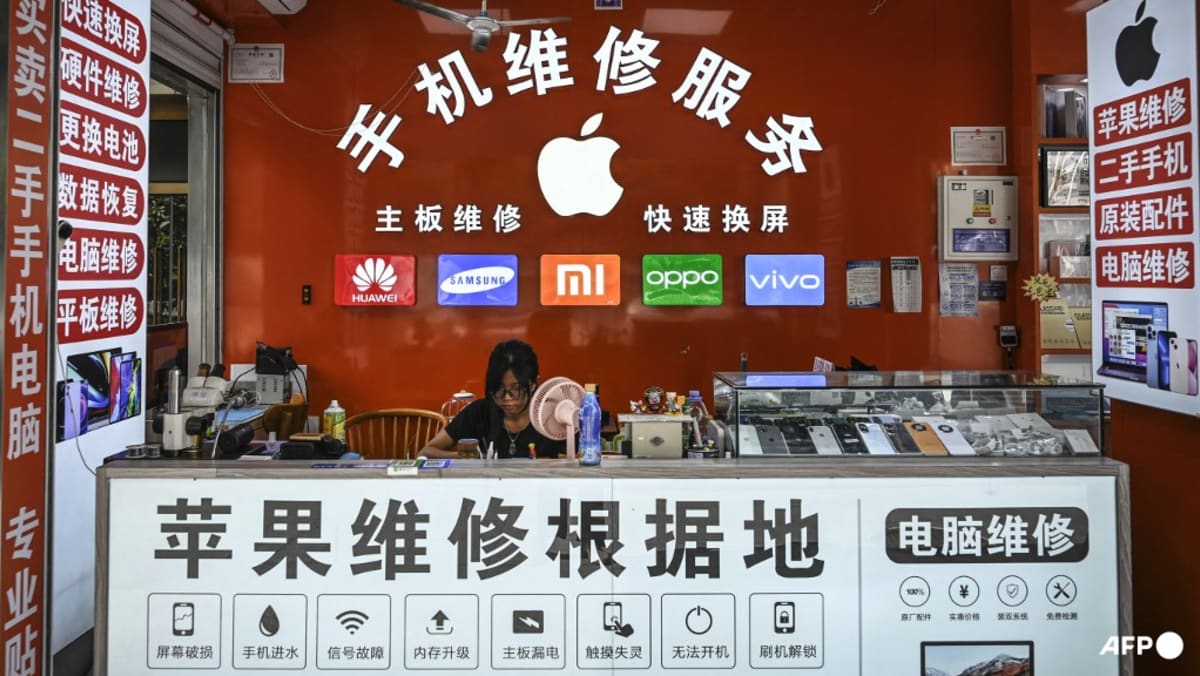
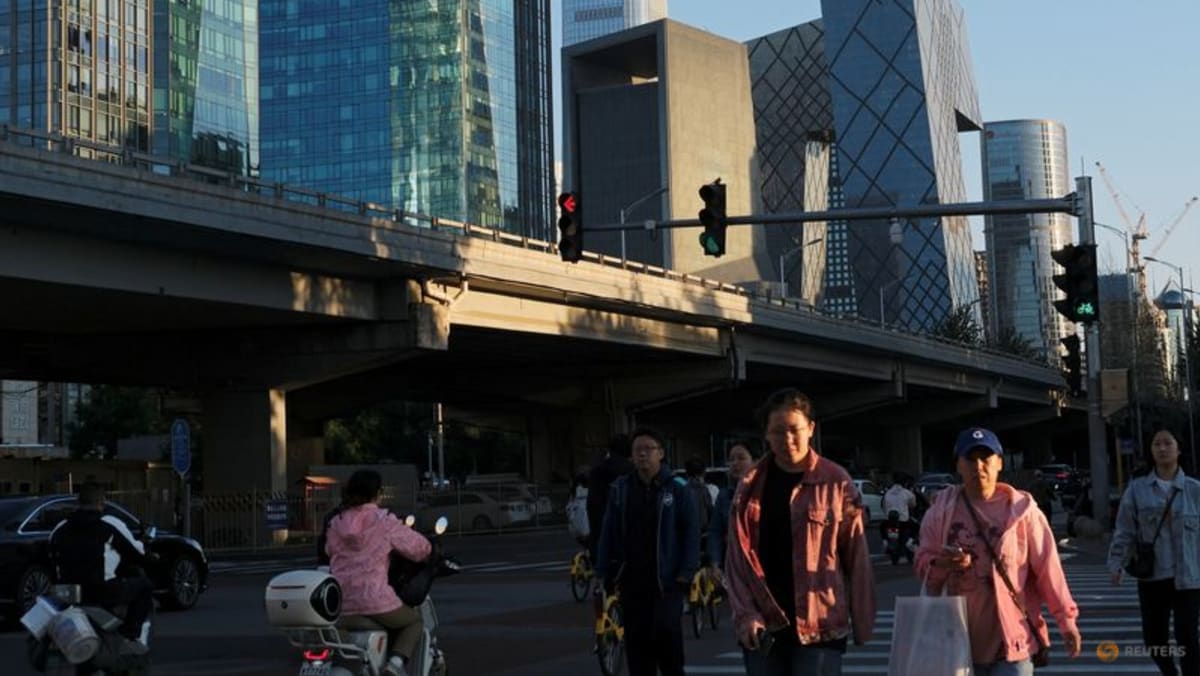

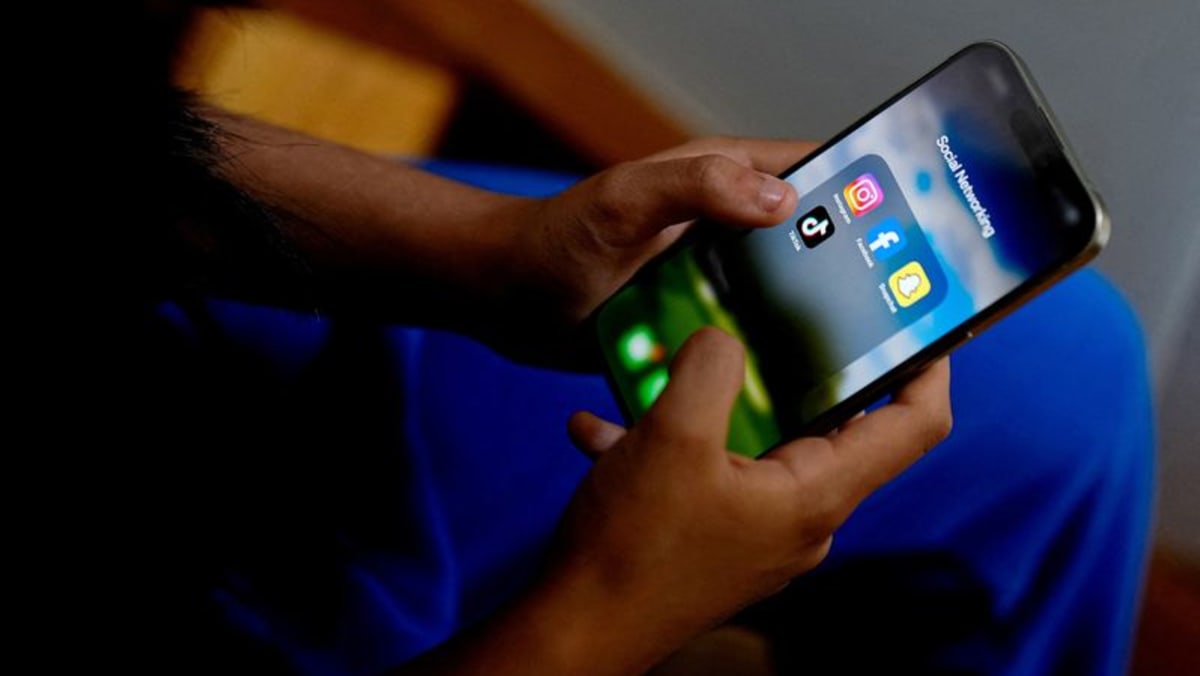


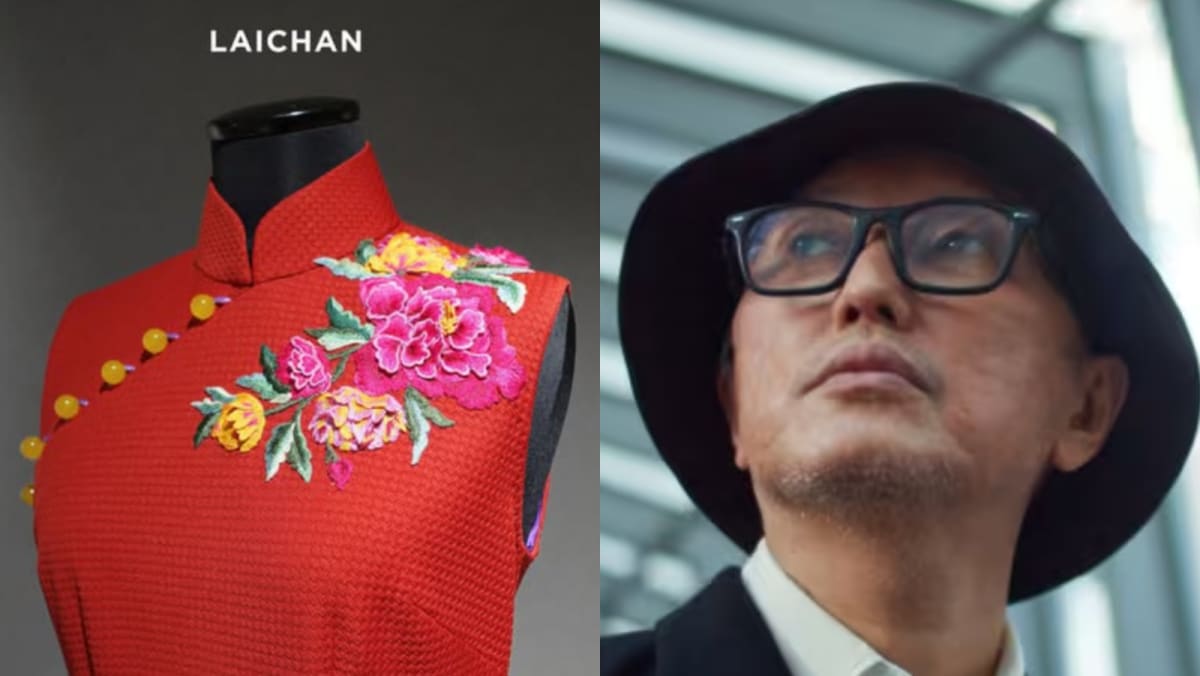






.jpg?itok=Ox6HmVBj)













